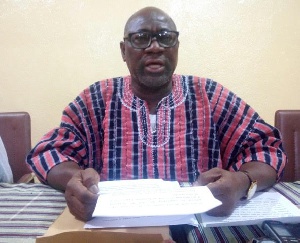Alhaji Sulemana Alhassan, Upper West Regional Minister has stated that they can no longer neglect nutrition issues as it has become a social canker that affects health, education achievements and sustainable development.
He said it was for this reason that the National Nutrition Policy of Ghana called for nutrition agenda in the policies of each sector to comprehensively address the nutritional problems facing the country.
Alhaji Alhassan who stated this during the Regional Nutrition Review and Advocacy Meeting in Wa noted that the challenge was for them to align their efforts appropriately through identification of key indicators for each sector.
“We need to work to ensure that nutrition-sensitive development and people’s nutritional wellbeing were placed at the centre of our priorities”, he said and added that there was also the need for them to provide incentives to those who gave increased priority to preventing and responding to under-nutrition.
Alhaji Alhassan also underscored the need for the region to set its own regional priorities for nutrition, saying it was the way to go for sustainable results.
He said in that regard, the Regional Coordinating Council (RCC) with support from the UN REACH established the Regional Nutrition Steering Committee to promote multi-sectoral approach in programming for nutrition.
“Over the past years, the RCC in close collaboration with the Ghana Health Service (GHS), Civil Society, Academia, and the UN Agencies worked together to complete a stakeholders mapping database of nutrition interventions in the region and identified the nutrition priorities with a clear road map to harness the potential of stakeholders to scale up nutrition”, he said.
The Regional Minister said all the efforts, however, have been challenged following the folding up of the UN REACH programme but was quick to add that the Netherlands Development Organisation (SNV) supported the work of the committee last year and used the opportunity to thank the organisation while hoping for the partnership to grow from strength to strength.
Alhaji Alhassan highlighted the need for stakeholders to work together to seek ways to tackle malnutrition in all forms with particular emphasis on interests and needs of women and children.
“At the local government level, we must start to support by making consideration for nutrition budgetary interventions seriously”, he said while urging other departments and NGOs whose job contributed directly or indirectly to improving nutrition indicators not to relent on their efforts.
The Regional Minister also urged the media to play its watchdog role very well by keeping all stakeholders on their toes to deliver to help kick out malnutrition.
Mr. Eric Banye, SVN Country Programme Coordinator used the opportunity to remind participants about the Voice for Change Partnership (V4C) programme, saying it operated on three main pillars including capacity development, evidence creation and dissemination and evidence based advocacy.
He said the V4C programme also placed emphasis on three important thematic areas namely; Nutrition, Water and Sanitation Hygiene; Post Harvest Losses (PHL); and Clean Energy.
On the importance of sustainable nutrition for all, Mr. Banye noted that nutrition was increasingly becoming a fundamental human right but often regarded as an afterthought in most parts of the globe and underemphasized in most development plans and strategies.
The SNV Country Programme Coordinator added that under-nutrition was often addressed solely as a health issue while government programmes rather focused on infrastructure provision.
The consequences of the actions were captured in the 2017 Global Nutrition Report which revealed worrying forms of malnutrition including; childhood stunting, anaemia in women in reproductive age, and overweight adult women.
Health News of Sunday, 14 January 2018
Source: ghananewsagency.org

















